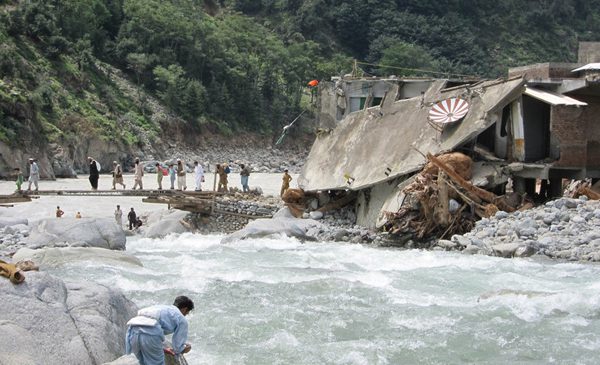Qasim Berech, 30, is a public health expert with Oxfam in Pakistan. He travelled to Upper Swat on 16 August. This is his account of the journey.
People in Upper Swat Valley have been living in a nightmare since the floods began. They’ve been almost completely cut off from the rest of the country.
What most concerns me as an Oxfam worker is there’s a chronic shortage of clean drinking water in many places. Worse still, some people are desperate enough to drink water from the river. The pipes which normally bring them fresh water from springs have been swept away by the floods.
It’s a vicious circle. People need water. There’s no clean safe water so they drink from the river. But the river water isn’t clean and we’re worried about outbreaks of disease. We’re already hearing that people are suffering more and more from diarrhoea.
It’s now about two and half weeks since the floods began and the waters have finally started to recede in Swat. Today, we have decided that it is time to try to get through and see for ourselves the situation on the ground.
My team of five plus myself begin our journey from Mangora in Lower Swat to reach the city of Bahrain, a city in Upper Swat. It’s been cut off for weeks and is only accessible on foot.
We are carrying with us 100,000 sachets of water purifier powder, closely packed into 400 small cartons. Each sachet will make ten litres of clean water in just 20 minutes. It can make the difference between a sick child and a healthy child.
We leave Mangora at 9am by van. The rain is still coming down hard. As a Pakistani, I’ve never seen weather like this in my life. A very old local man says he remembers a flood in 1929 but that it was nothing compared to this. This is unique in my nation’s history.
An hour and a half’s drive gets us only to the village of Fatehpur where we’re told the roads and bridges ahead have been destroyed. We have to leave the car behind and move ahead on foot. I arrange to hire eight labourers to help carry our cartons.
As we walk, I can’t stop looking at the houses, hotels and shops around me. These are concrete buildings which collapsed as if they were made of paper. It’s hard to believe that just water has caused all this destruction and misery.
Half an hour’s walk gets us to a road where we stop and hire another van. This time, we get as far as Jarri village before another collapsed bridge forces us to start walking again.
This time, our walk is far more difficult since the track is muddy and slippery. We manage to reach the small town of Madain where, for the third and last time that day, we are able to find another vehicle. But we’ve only been on our way for two or three minutes before another collapsed bridge stops us in our tracks.
We’re not alone on our travels. We stop and ask some men that we pass where they’re from. Most have come from the remote parts of the Upper Swat and have walked for at least a day. They’re heading for Fatehpur to collect food being handed out by the aid agencies. For most of these people, this will be the only food they will have had for days. They’re hunched over and carrying sacks of wheat flour, oil, rice, pulses, sugar, salt and biscuits on their backs – enough to keep their families going for a week or more.
There are women too – collecting water from the river for their families. They know they shouldn’t drink it. It will make their children ill. But they have no choice.
These people have nowhere to go. People from Swat are very poor – they can’t afford to go somewhere else and rent a home. And they don’t want to leave their homes or their livestock. The luckiest ones will have relatives they can go and stay with – but it’s getting harder to find people not affected by the floods.
It starts to rain even harder which forces us to slow our walk. It’s difficult to keep your footing in this kind of mud. Everyone is struggling but no-one complains.
There are frightening moments too. Because many bridges have been completely swept away, locals have done the best they can with whatever is to hand. We cross several bridges which are just pieces of wood held together with rope. They’re pretty dangerous – I cross holding on tightly as the bridge shakes from side to side. What worries me most is my team – I have five people with me plus the labourers.
At last, after nearly four hours of hard walking, we reach Bahrain at 4pm. We’re all tired and soaked but know it was worth it. We manage to distribute powder sachets to nearly 3,000 households. At 30 sachets per family, that will give them clean water for 15 days. We will go back again today (Sun) and as many times as we need to. We all need to work together to get help to wherever it’s needed most.
